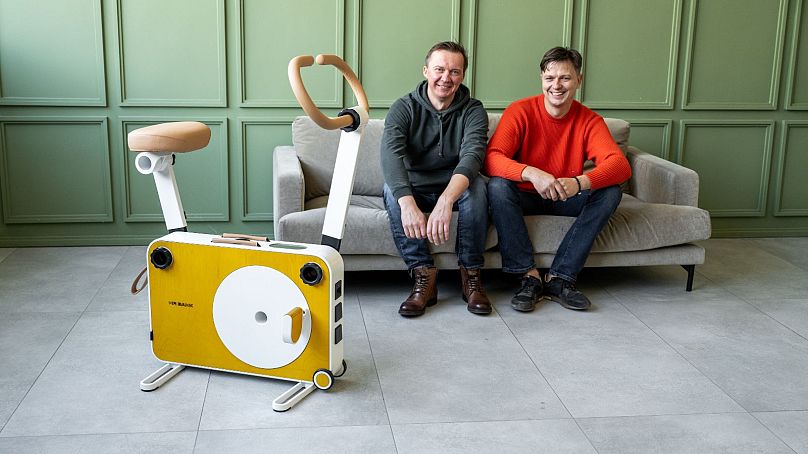The consciously designed bike can power your phone in 15 minutes - or put on an entire play, as audiences have seen in Lithuania.
Next time you hit the gym or jump on your exercise bike, take inspiration from the fact you could be powering a work of art.
 ADVERTISEMENT
ADVERTISEMENT
 ADVERTISEMENT
ADVERTISEMENT
While chances are you’re the only one feeling the fitness benefits, a new tech and theatre partnership is proving that anything is possible.
Two specially created exercise bikes powered an entire play in the Lithuanian National Drama Theatre last weekend.
“When we created the bike we never imagined that it would be used on stage during such a performance in the national Lithuanian theatre,” says Jonas Navickas, CEO of Tukas EV which makes the bike-cum-energy storage units.
But performances of ‘A Play for the Living in a Time of Extinction’ are showcasing the bikes’ versatility. “It can power your laptop, smartphone or even provide energy for the whole house, regardless of where you live,” adds Navickas, who founded the Lithuanian startup in 2010.
Why was the play powered by bikes?
Written by American dramatist Miranda Rose Hall, the play takes the form of a monologue in which the main character narrates the history of Earth, explaining the creation and extinction of its various species. The storyline emphasises the potential role of humans in causing the world’s sixth mass extinction.
Rose Hall and British director Katie Mitchell have adapted the piece to be easily replicated in any country. As part of the STAGES (Sustainable Theatre Alliance for a Green Environmental Shift) initiative, the idea is to put on the play with completely local resources.
That means a local director, local actors, local sets and even locally generated electricity - which is where the bikes come in.
This ‘co-production system’ enables a play about the crisis to tour the world - from Europe to Taiwan - without adding any fuel to the fire.
Co-funded by the EU, the alliance describes itself as, “an ambitious sustainable theatre experiment to re-imagine how the cultural sector interacts with the concept of sustainability.”
14 European theatres are on board so far, including Théâtre de Liège in Belgium, Croatian National Theatre in Zagreb, Théâtre Vidy-Lausanne in Switzerland and Piccolo Teatro di Milano in Italy.
As part of a commitment to only use electricity generated by the people on stage (up to 150 watts) the Lithuanian production of Hall’s play is powered by two actors on bikes.
With just 15 minutes of pedalling, one of Tukas EV’s ‘HR Bank’ bikes produces enough electricity to charge a smartphone. Three hours of pedalling generates sufficient energy for the entire 1.5-hour performance. So two actors pedal two bikes to keep the show going, including the lighting.
How does the energy storage bike work?
HR Bank can generate from 50 to 300w/h of electricity by pedalling it like a regular exercise bike. This energy can be stored in a battery of 2 kWh - roughly the same amount of electricity needed to keep a light shining for a week.
Navickas has revealed that he was partly inspired to make the bike last year after witnessing the war in Ukraine.
“When the bombing of Ukraine’s infrastructure started, I was shocked by the sight of people with many extension cords trying to get electricity from one power generator to charge their phones,” he told UK newspaper the Guardian.
HR Bank can provide an off-grid solution when a disaster - manmade or ‘natural’ - strikes. And it’s been consciously crafted with sustainable materials, according to Tukas EV.
“Sustainability in production is a continuous responsibility rather than a passing trend,” says Navickas. “We understand that the materials we choose today have lasting implications for the future.”
With that in mind, the bike is made from recycled aluminium and FSC-certified birch plywood.
It’s customisable and portable (with trolley-style wheels), with an optional desk attachment for home and office work. But not yet affordable for most, at around €3,000.











